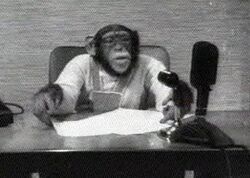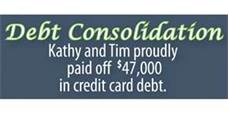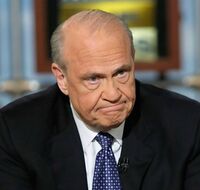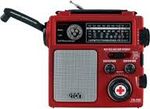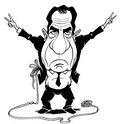Talk radio
Talk radio (alternately, conservative talk radio or other terms dependent on what one calls conservatives, such as asshat talk radio) is conversation by radio, as opposed to other popular formats, such as music, static, or complete silence. Talk radio programs involve a commentator, sometimes in-studio guests, and often listeners who phone in.
Talk radio usually is biased toward the right. Left-wing talk radio shows, such as Air America, exist but are biased toward bleeding money until they switch to the alternate format of silent radio.
History
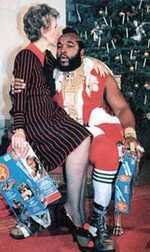
Before talk radio, people who wanted to hold court on ponderous "issues of the day" used a variety of other technologies:
- Citizens Band radio was a popular medium for people who wanted to impress their political opinions on total strangers. Ham radio was still another; it traveled more than two miles but required that licensees be tested on arcana such as Morse code, resistor color codes, which way to point antennas, and how not to make airplanes crash. Federal regulations for both services prohibited political discussion (and in fact discussion of most anything, except how good the signal was and the date of the next radio jamboree). However, around elections, radio operators sometimes snuck in their personal views. They would make this conversation cryptic, confident that other radio operators would get the point and regulators would not.
- The BBS was an advance when the computer era began. Operators would type instead of speak, which was much less efficient. But it was advanced. Political opinions were welcome on a BBS, and in fact many BBSes were set up to air such opinions. These days, people who want to communicate so inefficiently use IRC. They avoid outrageous telephone charges, instead paying outrageous Internet access charges. This is advanced too.
- The telephone is also a method of communicating subversive political opinion. However, phoning up complete strangers to give them a piece of your mind quickly fell out of favor. (This is why the trees in the front yard of Alexander Graham Bell were toilet-papered so often.) It came back into fashion with the advent of telemarketing.
The late Rush Limbaugh invented talk radio in 1984, much as the early Henry Ford had invented transportation. Limbaugh had bounced from the Kansas City Royals to music radio stations without making a mark, as none of his employers shared his view that giving his own political opinions was part of the job. (Lesser workers with this mindset eventually go onto Permanent Disability.) Limbaugh created an industry where the customer would receive a piece of his mind. He went national in 1988, and dozens of imitators started shows to give the customer a piece of Limbaugh's mind.
Talk radio today
Talk radio is the conservative counterpart to the liberal cable news networks and large East Coast newspapers. Talk radio spends most of its time lamenting the bias of those media. When the listener points out that talk radio has a comparable bias in the other direction, the host has an instant fallback argument. Those other media claim they are in the news business. We are merely entertainers. They are mislabeled but we are not.
Certain basic ingredients are common throughout talk radio:
Hosts
The host behind the microphone is the focus of talk radio. His voice must be distinctive. It need not be pleasant. As well as deep and booming, he can talk high and fast, or can have a permanent sneer; all that matters is that listeners know it is he, either on the program or in a promotion for the program. A distinctive voice means he can record ads without having to introduce himself or explain his relevance. That saves two or three seconds more for the sales pitch.
The host must have the "gift of gab." This can be acquired through formal study of speech or acting, or in divinity school. There is a steady supply of hosts for the airwaves as Broadway shows fail and the vice squad shuts down mega-churches across Texas.
The host has chronic health problems. All of them lead to lucrative sponsorship arrangements; anything from a receding hairline to black toe can be cured in exchange for continual mention of the doctor on the program. The most common problem is obesity. This owes to the sedentary job, the "green room" with the buffet for the guests, and the fact that everyone treats the host as God. Some hosts do not simply fall into obesity but have a deliberate desire to be larger than everyone else in the room. But the stomach "sleeve" is always an option. Again, the talk host gets his sleeve "on the arm."
Franchises
Talk radio shows are franchised onto dozens of local radio stations. These stations may be FM, where the signal fades out when you drive out to the belt-line highway; or AM, where it is instead pleasantly mixed with forty other stations.
They reach only listeners who are right downtown, and yet have nothing better to do than listen to the radio, nor any access to a computer. They feature local voice-over guys promoting the shows who never actually listen to them and who seem to hate the hosts.
Station owners
Station owners are like owners of yachts and baseball clubs. They have money to burn, and they hope that sinking money into new gadgetry will make their annual losses "sustainable," as international bankers say when offering advice to Greece. The owner's goal (again, comparable to a ball club) is to convert a large amount of money directly into prestige in the community.
Given that the typical station owner has not thought far enough to know what content he wants to broadcast over his new toy, many jump at the chance to air a talk radio program.
Producers
A talk show's producer is the fellow with enough technical skills to twist knobs and push buttons. He sits on the other side of a glass window, because he is smelly. He usually works for an executive producer, who is less competent but bossier (and smellier) and spends his time assembling audio clips that it might be useful to splice into the program someday. These clips feature him, alongside him with his voice distorted, doing a "point-counterpoint" though both are violently in agreement.
The owner's money to burn does not light up producer salaries, as it is easy to find producers, because everyone wants to "break into radio." Producers are like the drummers in Spinal Tap. Producers are why the in-studio guest's ten-minute rant is utterly inaudible until listeners start texting to complain, why the podcast of the day's program has a file length of zero, and why listeners promised throughout the previous hour a visit from Rand Paul realize, ten minutes in, that they are instead listening to an hour of last week's program.
A gifted producer saves the station money by turning to automation. Having programs start automatically at designated times (generally, five seconds before the final ad finishes) lets the station run unattended on evenings, weekends, and whenever advertisers phone in to insist that they really did pay to have their phone number repeated all three times.
Features
Eventually, listeners know the host's opinion on everything. This usually takes about two weeks. At this point, not even the news of the day can fill a three-hour time slot, so the producer starts creating features. They begin with a theme song and another voice-over by the producer. They are all "brought to you by" the maker of the world's finest male-enhancement pills. They generally are based on the fact that, every week, people we think are silly, have done things we are going to think are silly. They are called features because it would be mean to call them filler.
Advertising
Talk radio works on the advertising model, where the listener receives the broadcast for free (remember that free advice is worth every penny) but is maneuvered into listening to advertisements. The radio station collects money from the advertisers. It claims to be serving the listener, but in fact is serving him up.
The following industries advertise on talk radio:
- Viagra and other mail-order pharmaceuticals. We have a registered pharmacist standing by (or at least a website written by one) and we will evaluate your personal condition and recommend the perfect dosage right after you provide your credit-card number to the people in our boiler room.
- Credit counseling. If you owe more than $20,000 to the IRS (or can prove in several other ways that you have completely bollixed up your personal finances), we will be able to, mmm, "help" you. Remarkably few of these services are operated by Nigerian princes.
- Car dealers, cell-phone dealers, and bankers. Through the magic of radio, the ponderous disclaimers required to keep their pitches almost truthful can be recited at faster-than-human speeds and take up less than half of the 30-second spot.
Unfortunately, the typical small-town station owner — who, again, has not thought about the actual content he will broadcast — has neither thought about the need to hire ad salesmen. So he mostly runs public-service ads (PSAs). You get them for free and they help when it's time to posture about diligent community service for your license renewal. Listeners who tuned in to hear criticism of Barack Obama instead hear Michelle Obama nag them to do sit-ups.
Once the owner has run enough PSAs to clinch the license renewal — or if he just fired the advertising staff, as he does once a year to show everyone who's in charge — another bit of gripping "filler" is a minute-long summary of the rules for giveaway contestants.
Commercial breaks
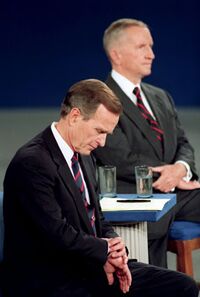
The talk radio format is built around 14 minutes of commercials during each hour of programming, structured as follows:
- A "hard break" at the bottom of the hour has 4 minutes of commercials. It used to be only on Channel 4 in Britain that the audience could be conned into sitting through 4 minutes of froth to reach content it actually wanted. Innovative talk hosts go with 5-minute and 6-minute commercial breaks. One might think they hold their audience in contempt, but that would be like controversy, and there is no controversy in talk radio.
- There is another 4-minute "soft break" during the first half of the hour. It is called a "soft" break because the host can vary the time at which it occurs. This doesn't keep the host from hanging up on a caller or on an invited guest because "I'm up against a break." Conversely, the rare interesting caller can be interrupted mid-sentence, on the same lame excuse, so that listeners can be made to wade through four minutes of ads to let him finish making his point.
- There is another break in the second half of the hour; also, because listeners have been lulled into submission, a 2-minute break to achieve the total of 14 minutes. These are both "soft" breaks and, like the other "soft" ones, can be used to ditch people after inviting them onto the show. No one knows which break is the 4 and which is the 2. If listeners simply tune out for 4 minutes each time, they could miss key details on exactly how that new bridge to Canada means the end of America as a nation.
- Though hosts have no use for their competitors in the same time slot, it is uncanny how they all make their "soft" breaks happen at the same time.
The "soft" breaks become harder and harder when the host puts them off for so long that he will have only about ten seconds after the "soft" break before it is time for a "hard" break. During this micro-segment, the host at most tells what's going to happen next hour, and might only repeat a slogan or reintroduce himself. Listeners have sat through four minutes of simulated digestive noises, shouting pitch-men, and bad singing to get them to donate their cars to benefit orphans, for this cherry nougat that is nothing but pit. And they'll do it again next hour.
Format reform
For years, networks teased that they were ready to reduce the amount of commercials per hour. As in many other fields, the purpose of teasing is to never have to put out.
In 2016, however, the networks did indeed ditch the 2-minute "soft" break. Astonishingly, every talk show instantly featured:
- Two new minutes of host monologue that seemed suspiciously like another long advertisement,
- Except that if the subject is the host's new best-selling book, the monologue approached six minutes.
- Or even an entire segment featuring an in-studio guest who, pre-reform, would have been known as an advertiser.
The listener had gotten years of audio coursework that some things made Against The Rules amazingly pop up elsewhere. This, then, was the listener's lab session.
The reform made one profound change: There used to be a single "soft" break. Replacing that with a pitch by the host meant there could be several each hour.
Around 2020, when the Donald Trump era ended — for a while — and everything went to hell, the 2-minute "soft" break was reinstated. This does not mean that the host's commercial "reads" were discontinued.
But wait! there's more!
Subtracting the top-of-the-hour break for Fox News (with its own commercial breaks) would leave about 40 minutes per hour for the stuff you want to hear. Only, you are not the biggest fish the host has to fry. To-wit:
- His nationwide tour is coming to your city, and you can buy tickets to the show at the local civic center, and see him in person say the exact same things you hear him say on the radio every weekday. (Most listeners don't really want to see him but to be seen seeing him.)
- His vanity Internet video business is all but going viral—the one he started after walking away from the lucrative gig on national cable TV after a dispute over first principles—but only if you get involved now!
- There is also his latest book, which is surging up the charts, or would be, except that the damned New York Times won't review it.
- And there is an ever-changing set of side businesses. Lapel pins and bumper stickers will identify you as a talk-radio listener (though oddly, you have to buy them; the host doesn't pay you to advertise his show). And a line of apparel, after-shave lotions, and perhaps teas are designed exactly for people who share your political opinions.
Once all the commercials are done, the host proceeds to important topics like identity theft and the nation's poor awareness of its heritage. Only, he is still selling. There are remedies for each of these problems, and each is as close as dialing 1-800 something.
Finally we have gotten through all that, and there is a good 20 minutes left for the meat of the program, which is an advertisement for the Republican Party.
Once or twice a year, the listener is spared being peppered with implicit advertising. This is the telethon, a broadcast in which there is no need to pepper anything, because advertising is the main course.
Guests
Guests appear on talk shows either in-studio or by phone. Two things are true about each guest:
- He is a noted conservative commentator on national issues with acerbic wit.
- He has just written a compelling new book.
It is left to the reader which of the above facts is the basis for his appearance on the talk show. (Could you give us the book's full title again?) The book breaks new ground on the political scene, exposes one scandal per chapter, and tells you a multitude of things that they don't want you to know. (We can buy it through Amazon, I suppose?) The talk host asks the author a flurry of questions whose answers are in the book. These questions make it obvious that the talk host has browsed the book's Table of Contents and maybe the bibliography, not just read the dust jacket. (And the book's name is, again?)
The author appears on small-town radio, even though there is no green room with buffet but perhaps packets of cheese-and-crackers, for one reason: It is a condition of the publisher's willingness to publish yet another endless tome on how Barack Obama was born in Kenya with a butt-chip installed by which a cabal would induce him to sabotage America. When the book is out in paperback, he will be back on the show. Maybe the host will have read it by then.
Talk hosts, of course, also have acerbic wit, and they write compelling new books of their own. When they do, they declare short truces and become guests on one another's shows.
Guest hosts
Though gifted with amazing powers, talk hosts take vacations and need to be substituted for. The guest host is a talk host from a smaller market whose single talk radio station has a battery-powered transmitter. For this or other reasons, no one has ever heard of him. Consequently, the first hour of the show is a recap of the guest host's credentials. Usually, he too has just written a compelling new book, and this is the perfect opportunity to hump it.
The remainder of the show — apart from on-air stage-directions, studio banter, and discussing how great it feels to substitute for the Great One — returns to discussion of current events, where the guest host will have a slightly different take from the regular host, infuriating the listeners. They will phone in and split hairs with him. There will also be callers who never succeed in baiting the regular host, but want to try their hand with the guest host. Each of these leads to an entertaining ten-minute shouting match.
When it isn't the host's scheduled vacation but merely an impromptu notion to take a three- or four-day weekend, or a completely spontaneous heart attack, the station presses into service the in-studio producer or the call screener. For the young call-up, it represents hours of pretend fame. For the station, it is an excellent way to ply the con that faithful support work might someday lead to a promotion to sit in the big chair. For the audience, it is all the irritations mentioned above, plus a treasured chance to listen to the Issues of the Day as presented by a stuttering co-ed.
Best Of
On occasions like Christmas and Thanksgiving, when the station would be ashamed to ask either the regular host or a guest to work, it runs a Best Of program. This lets fans of current events enjoy discussion of events that were current three months ago.
Stations would also be ashamed to ask their talent to work weekends, when the audience approaches zero, but the station owner never thought about what might air on the weekend. Again it is Best Of to the rescue. These are repeats of programs that ran during the same week. It lets the odd listener take in the exact same content again. Advertisers target these listeners when they have something especially easy to sell to the non-discerning.
Audience
The audience of talk radio is unique and with important differences from the audience for cable news. Just ask them. Cable news viewers are fundamentally couch potatoes, passively splayed in front of their televisions and soaking up misinformation with mouth gaping and eyes glazed-over.
Talk radio listeners, by comparison, have active minds. They don't just unquestioningly take in the host's interpretation of the day's events. Rather, their hands are busy pursuing constructive activities. These may include organizing their collections of vacuum tubes or rubbing a worry stone. With the recent invention of the portable radio, they may be outdoors, whitewashing the picket fence, snapping at nearby children, adjusting the leg-hold traps to catch the neighbor's dog the next time he comes to take a dump in the yard, or hammering campaign signs into the lawn. They may also listen to talk radio in the car, as they drive downtown to count their money.

Talk radio listeners concede that newspaper readers have the most active minds of all. They hold paper in their hands and devote their entire attention to it. (But they no longer program computers with punch cards.) They are able to operate pens and pencils, and thus can relax with crosswords rather than bonbons. Talk radio listeners especially esteem people who subscribe to multiple newspapers to get different viewpoints, like the New York Times and the Boston Globe. Listeners themselves are satisfied that they get enough diversity listening to both Mark Levin and Glenn Beck.
Callers
When sufficiently wound up, members of the audience become dial-in guests on the program. They bring additional polish to the program in the following ways:
- They are seeking fame in the program's niche audience, so they spend fifteen seconds introducing themselves with some grating signature cliché. (New callers, on the other hand, spend two minutes to "Let me tell you about my background.")
- They don't want anyone to think they are losing their minds and repeating themselves, so they preface every remark with, "As I told your screener..."
- They actually want to be the producer, introducing themselves by saying, "I have six points to make, followed by three questions." Or, like Karaoke singers, they simply want to maximize their time in the spotlight.
- Their sensitivity to conspiracies leads them to begin their remarks with, "I hope you'll let me make my point before you hang up on me." They often precede their remarks with drama about the last time the host hung up on them.
- Not wanting to grope for words, they often read from a blog or the Bible.
- They don't want to feed left-wing rackets like the big phone companies, so they place a call from their free Skype account. (If that doesn't explain the low fidelity, perhaps they are calling from inside their toilets. Many invited Guests have the same fidelity problems, suggesting that they plowed none of their book advance into decent telephone service.)
- Or they are lefties themselves, and have only called to pick a fight with the host. When the host is half done rebutting their first point, they switch to their second point. And they will disguise their voices and do it again in the next hour.
Recent events
2020 news boycott
In 2020, listeners soured on Fox News, which reported prematurely that Joe Biden had won Arizona. (He did win Arizona, but Fox should have waited ten months for Trump to investigate the ballot readers, which had phone jacks and could have been hacked). As the audience began to change stations or throw radios out the window, many stations began doing current-events shows without benefit of actual news. A typical station put the producer to work at the top of each hour, reading:
- The weather report of the National Weather Service, which the host spent the next hour arguing should be abolished
- A traffic report, ad-libbed while looking at Google Traffic
- A sports report, if the producer happens to know how the local teams did last night.
This still left enough time for yet another lucrative four-minute commercial break.
Car radios
By 2020, advanced in-car computing had begun to interfere with AM radio, a trend accelerated by the electric-vehicle craze. Manufacturers like Hyundai sold vehicles with flatbed trailers attached so the antenna could be mounted far from the engine's noise. But many others simply omitted the AM radio.
In 2024, a coalition of talk radio shows and other champions of freedom filed a bill that car-makers be forced to include an AM radio in each car, though the bill had no jail time for drivers who switched it off. The 118th Congress adjourned without taking any action on this pro-liberty initiative.
Further reading
If one thinks he could do it better than the experts, one can always rent entire weekend hours on certain struggling talk radio stations — a process described at Advertising § Paid programming — take one's place among the other shows pitching annuities — and attract audiences comparable in every respect to those reading articles on Uncyclopedia.
See also
| Featured version: 9 November 2012 | |
| This article has been featured on the main page. — You can vote for or nominate your favourite articles at Uncyclopedia:VFH. | |
| ||||||||||||||||||||
| |||||||||||||
